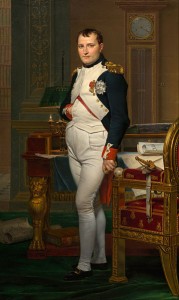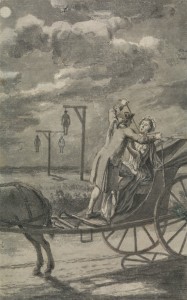In the wake of last summer’s debt-ceiling crisis, Republicans blamed America’s slow economic recovery on big government – or rather, the threat of big government. They claimed that a “climate of uncertainty” – a fear of future regulations and taxation – was keeping “job creators” from hiring. Economists convincingly demonstrated this wasn’t the case, but austerity policy, individual liberty, and economic growth continue to be nearly synonymous on the right. The founding fathers are frequently called upon to bolster the cause of all three, but links between national debt and big government predate them. The Seven Years War (1756-1763, aka the French and Indian War) may be remembered for incurring the debt American colonists so famously refused to pay, but government borrowing was persistently controversial in eighteenth-century Britain. It wasn’t unusual to blame economic slowdown on a very similar “climate of uncertainty”: “The people of a country will teach one another to be industrious…as soon as they find themselves secure in their property” (in the House of Commons, December 1747). National debts gave “a power to rulers which they ought not to have; create a kind of state pawnbrokers, which ought never to be suffered; enslave the people with a dread of annihilating their property” (London Evening Post, 9-11 May 1749).
Anti-establishment readers of the London Evening Post, like Tea Partiers today, considered themselves the true heirs to revolutionary principles. The Glorious Revolution of 1688 ousted the troubled Stuart dynasty. The revolutionary settlement limited monarchical power, most notably the power to tax, freed the judiciary from the executive, and enshrined the freedom of Parliamentary speech in a Bill of Rights. These developments laid the groundwork for a powerful fiscal-military state, championed by the Whig party, who favoured the politics of consent over the divine right of kings. John Locke’s emphasis on the protection of “life, health, liberty, and possessions,” reflects a very specific historical context. 1688 was arguably a very modern moment.
The new state also created new national debt, financed by the Bank of England and by joint-stock monopolies like the East India Company, and underwritten by the confidence public creditors had in their government and in England’s commercial future. By 1720, however, this confidence had been shaken by a market crash, and attendant revelations that one joint-stock company, the South Sea Company, had bribed government officials for the privilege of selling national debt on the stock market. As Company directors committed suicide, fled the country, and dodged pistol-wielding stockholders in the street, the Whig establishment faced growing criticism for mortgaging the state and its taxpayers to private corporations. (Foreshadowing, in interesting ways, the anti-Americanism of late nineteenth-century Britons, who thought American capitalism corrupted by special interests.)
This was a battle over origin stories. When the economy slumped in the 1740s, the government made its own bid to retread the economic principles of the 1680s: freedom of conscience and indirect taxes on consumption. Their attempts to naturalize foreign Protestants and Jews in the 1740s and 1750s assumed that Britain’s “art and ingenuity” might be improved by immigrants bringing new manufacturing techniques with them, and that a larger population meant an increase in manpower and the tax base. Despite this appeal to founding principles, “discontented Whigs” in the House of Commons rebelled: “Our distress proceeds not from a want of people, but from the weight and multitude of our taxes.” They were backed by a wave of petitions from every important trading town and interest group in the country. In popular economic discourse of opposition, taxation was less and less a question of revenue and more and more a problem of government authority. Parliament, the safeguard against arbitrary monarchs, now behaved like one itself: “having seized on the sovereign power, [they] exercise it as children do knives, who commonly hurt themselves and offend their mothers and nurses therewith” (Old-England, or, the Constitutional Journal, 2 April 1748).
Fear-mongers who sought to convince Britons that the government was coming for their property while immigrants came for their jobs (“those who have grown up under arbitrary government, may be fittest to answerarbitrary purposes”) were self-made merchant elites several generations over, and comfortable with the mechanisms of modern finance. Despite posturing in the popular press, they simply wished to pay down the debt more slowly, abolishing taxes on certain necessities (soap, candles) and trimming military expenditure in peacetime. They weren’t reactionaries who lamented the luxury and excess of commercial society – they were commercial society.
But this was precisely their dispute with the establishment. Just as Obama’s imagined rejection of American exceptionalism has been deeply offensive to the right, the anti-establishment crowd felt the Whig party had forgotten its mission. Where Britain was linked with Rome – “all states which are liberal of naturalization, are fit for empire” – they bristled. Discontented Whigs were imperial skeptics: evangelists for economic influence, but unconvinced that captive markets required formal rule. Rome pursued conquest for conquest’s sake. Its decadence and decline were cautionary tales of territorial overreach. Britain need not make that mistake. The opposition created an elaborate narrative of English exceptionalism that celebrated limited government and free trade as far back as Queen Elizabeth (crowned the “Patriot Princess” by the London Evening Post). After all, it was Elizabethan subjects who first carried English enterprise beyond English borders. Infrequent Tudor Parliaments created a strong economy by keeping taxes low and leaving the population alone, and if 1688 had made Parliament permanent, it had only done so only to safeguard these basic liberties.
In many ways, British exceptionalism became American exceptionalism. It’s not surprising that the “Patriot Party,” which acquired a name and leadership under the “Great Commoner” William Pitt, was later sympathetic to the American cause (even after the “Great Commoner” became Lord Chatham in 1766). The popular story of American difference often comes tinged with isolationism, but Americans inherited their idea of uniqueness. Americans were able to imagine themselves as special, not in spite of being British colonists, but because they were.
(Heather Welland is an Assistant Professor of History at Wake Forest University. Her research and teaching interests include the British empire, Atlantic history, interest politics, political economy, institutions and expertise, and Loyalism.)


